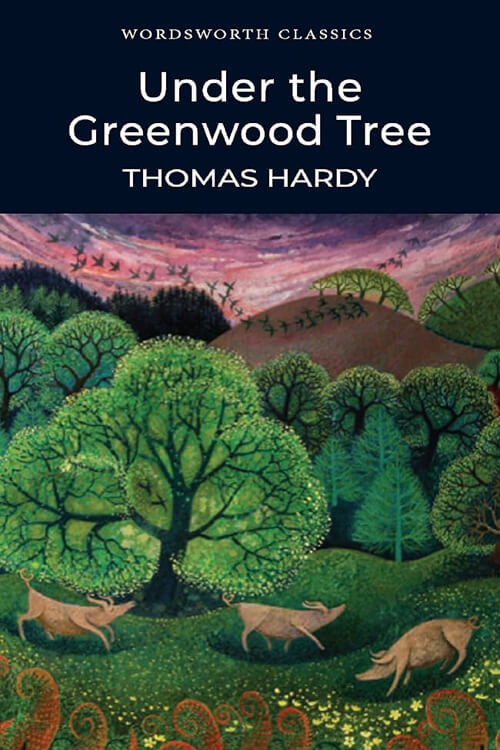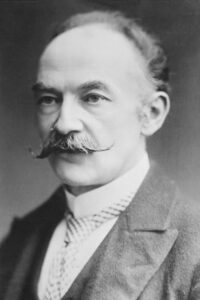
Under the Greenwood Tree
To dwellers in a wood, almost every species of tree has its voice as well as its features. At the passing of the breeze the fir trees sob and moan no less distinctly than they rock; the holly whistles as it battles with itself; the ash hisses amid its quiverings; the beech rustles while its flat boughs rise and fall. And winter, which modifies the note of such trees as shed their leaves, does not destroy its individuality.
On a cold and starry Christmas Eve within living memory, a man was passing up a lane towards Mellstock Cross in the darkness of a plantation that whispered thus distinctively to his intelligence. All the evidences of his nature were those afforded by the spirit of his footsteps, which succeeded each other lightly and quickly, and by the liveliness of his voice as he sang in a rural cadence:
“With the rose and the lily And the daffodowndilly, The lads and the lasses a-sheep-shearing go.”
The lonely lane he was following connected one of the hamlets of Mellstock parish with Upper Mellstock and Lewgate, and to his eyes, casually glancing upward, the silver and black-stemmed birches with their characteristic tufts, the pale grey boughs of beech, the dark-creviced elm, all appeared now as black and flat outlines upon the sky, wherein the white stars twinkled so vehemently that their flickering seemed like the flapping of wings. Within the woody pass, at a level anything lower than the horizon, all was dark as the grave. The copse wood forming the sides of the bower interlaced its branches so densely, even at this season of the year, that the draught from the northeast flew along the channel with scarcely an interruption from lateral breezes.
After passing the plantation and reaching Mellstock Cross the white surface of the lane revealed itself between the dark hedgerows like a ribbon jagged at the edges; the irregularity being caused by temporary accumulations of leaves extending from the ditch on either side.
The song (many times interrupted by flitting thoughts which took the place of several bars, and resumed at a point it would have reached had its continuity been unbroken) now received a more palpable check, in the shape of “Ho-i-i-i-i-i!” from the crossing lane to Lower Mellstock, on the right of the singer who had just emerged from the trees.
“Ho-i-i-i-i-i!” he answered, stopping and looking round, though with no idea of seeing anything more than imagination pictured.
“Is that thee, young Dick Dewy?” came from the darkness.
“Ay, sure, Michael Mail.”
“Then why not stop for fellow craters—going to thy own father’s house too, as we are, and known us so well?”
Dick Dewy faced about and continued his tune in an under-whistle, implying that the business of his mouth could not be checked at a moment’s notice by the placid emotion of friendship.
Read or download Book
Thomas Hardy
Thomas Hardy OM (2 June 1840 – 11 January 1928) was an English novelist and poet. A Victorian realist in the tradition of George Eliot, he was influenced both in his novels and in his poetry by Romanticism, including the poetry of William Wordsworth.
Biography.
He was highly critical of much in Victorian society, especially the declining status of rural people in Britain, such as those from his native South West England.
While Hardy wrote poetry throughout his life and regarded himself primarily as a poet, his first collection was not published until 1898. Initially, he gained fame as the author of novels such as Far from the Madding Crowd (1874), The Mayor of Casterbridge (1886), Tess of the d’Urbervilles (1891) and Jude the Obscure (1895). During his lifetime, Hardy’s poetry was acclaimed by younger poets (particularly the Georgians) who viewed him as a mentor. After his death, his poems were lauded by Ezra Pound, W. H. Auden, and Philip Larkin. Many of his novels concern tragic characters struggling against their passions and social circumstances, and they are often set in the semi-fictional region of Wessex; initially based on the medieval Anglo-Saxon kingdom, Hardy’s Wessex eventually came to include the counties of Dorset, Wiltshire, Somerset, Devon, Hampshire and much of Berkshire, in south-west and south central England.
Two of his novels, Tess of the d’Urbervilles and Far from the Madding Crowd, were listed in the top 50 on the BBC’s survey The Big Read.






